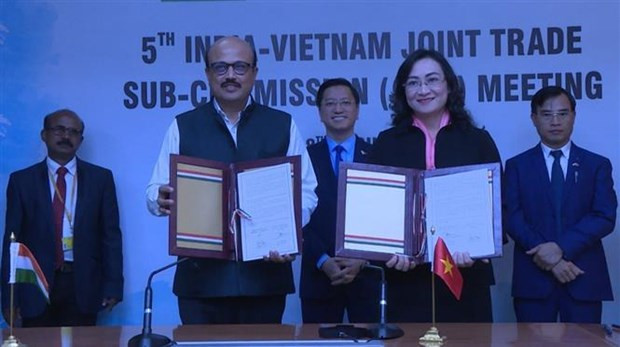In his remarks, Agrawal highly valued Vietnam's socio-economic development achievements, affirming that India considers Vietnam as a top-tier partner in Southeast Asia and always attaches importance to expanding economic and trade cooperation with the Southeast Asian nation.
He acknowledged the noticeable development trend in trade between the two countries in recent years, highlighting several positive changes since the 4th meeting of the joint sub-committee held in 2019 in Hanoi.
For her part, Thang remarked that there are many challenges ahead in the global and regional context, including economic recession, political conflicts, trade tensions, high inflation, and lower demand.
These issues will undoubtedly have an impact on the global economy, including both Vietnam and India, she said, adding that the meeting plays a crucial role in addressing difficulties facing businesses, ensuring continuity, and promoting bilateral cooperation.
She stressed that the two nations need to make efforts to foster sustainability-oriented two-way trade; remove trade barriers for imports and exports; promote market access for products of the strength of each side; boost collaboration in e-commerce; and strengthen business, trade, and tourism connectivity by opening more direct flights and increasing the number of flights between major cities of the two countries.
Agrawal totally agreed with the proposals by the Vietnamese official, saying that his agency will work with relevant Indian authorities to address lingering issues and difficulties in order to facilitate import-export activities of the two sides’ businesses.
India wants to elevate cooperation with Vietnam in terms of pharmaceuticals, processed food, tourism, and information technology, he said.
The two sides agreed to closely coordinate in organising trade promotion programmes and activities, fairs and exhibitions; and further expand trade links in areas with huge potential such as agriculture, aquaculture, textiles, leather and footwear, pharmaceuticals, chemicals, fertilisers, machinery, equipment, and consumer goods.
They agreed to bolster investment cooperation in area of joint interest.
Both sides pledged to push relevant agencies to complete the risk assessment process and move towards allowing market access for prioritised types of fruits in the near future.
















